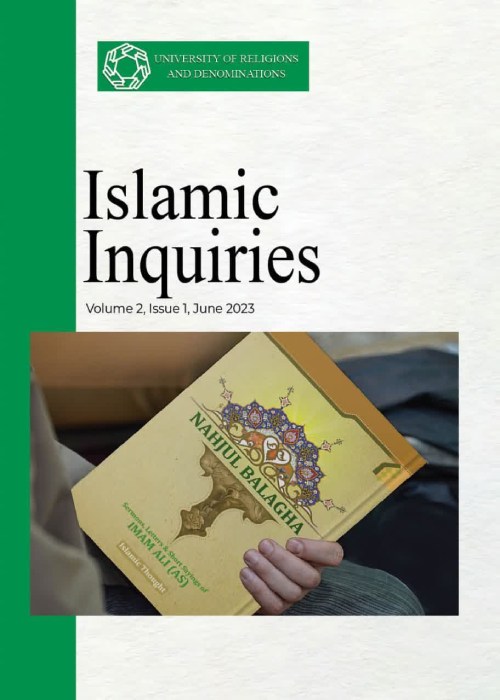فهرست مطالب

Journal of Islamic Inquiries
Volume:2 Issue: 1, Winter and Spring 2023
- تاریخ انتشار: 1402/08/15
- تعداد عناوین: 6
-
Pages 7-24
The fate of the captives of Banū Qurayẓa remains one of the most challenging issues in the Prophetic tradition. Saʿd b. Muʿādh was responsible for issuing a sentence for the captives of Banū Qurayẓa, which is stated in many sources of Islamic history as follows: all men were to be executed, while women and children were to be taken captive. This article delves into the historical background of Jews in Hijaz to examine the reports of narrators who witnessed the enforcement of Saʿd’s sentence on Jewish captives. It also scrutinizes various reports of this sentence, assessing the context surrounding the sentence, and questions the accuracy of the number of those executed according to historical sources, which range from 400 to 900 people. While historical records confirm that some Banū Qurayẓa Jews were executed, it could be argued that only their leaders faced the death penalty.
Keywords: Banū Qurayẓa, Jews in Hijaz, Jewish-Muslim relations, Islamic sources, Prophet Muḥammad, fate of captives -
Pages 25-40This paper addresses the concern over the sustainability of Indonesia as a nation, based on the unifying ideology of Pancasila. Specifically, the paper is concerned with the views and conduct of the Indonesian populace regarding the country's multifaceted diversity, as well as their perspective on the national ideology of Pancasila. Today, while some small groups consider Pancasila as an irrelevant national ideology, the majority of Indonesian people firmly believe that Pancasila has effectively served as a unifying force in the country. This is particularly evident when comparing Indonesia to other Muslim countries worldwide, which often grapple with disharmony, conflicts, civil wars, and even fragmentation. Their insights on the interplay between Pancasila and Islam have been a source of inspiration for the younger generation. Their contributions have played a significant role in establishing Pancasila as an ideology and a common platform, particularly in the face of attempts to undermine its principles. Even in the present day, their ideas continue to serve as a cohesive framework that unifies the diverse Indonesian population.Keywords: Pancasila, Islam, Four Muslim Leaders, De-Ideologization, nationalism, Indonesia
-
Pages 41-58The encounter between Islam and the West during the modern period gave rise to new challenges regarding the relationship between religion and modernization, leading to intellectual debates among Muslim scholars. In an effort to reconcile the conflicts between religious traditions and the intellectual advancements of modernity, two distinct intellectual movements emerged: revisionist traditionalists and religious intellectualism. The former criticized the intellectual principles of modernity while adhering to orthodox theological and jurisprudential beliefs, whereas the latter embraced the epistemic core of modernity, including relativistic autonomous rationality and its associated theories, while questioning the theological and jurisprudential foundations of the religion. Consequently, each movement presented its own interpretation of religious rationality. This article aims to conduct a comparative study of Ayatollah Motahhari's views, representing the revisionist traditionalist approach, and the ideas of Fazlur Rahman, who adopts the religious intellectualist approach, in order to explore the compatibility between tradition and modernity.Keywords: religion, modernity, Motahhari, Fazlur Rahman, Contextualism, Ijtihad
-
Pages 59-74The siege of Aleppo by the crusaders posed a threat to the city’s security, livelihood, and economy. The inefficiency of the city’s rulers brought Aleppo to the brink of collapse. In response, Shiite families and Imami judges in Aleppo worked to eliminate this threat. This study aims to examine the role of Shiite judges in creating security in Aleppo. The findings of this study reveal that the judges in Aleppo utilized their social and divine influence to invite powerful Sunni rulers, such as the Artuqids and the rulers of Mosul, to restore political, livelihood, and economic security in Aleppo. The judges’ political actions were primarily focused on military attacks, famine, disease, and the shutting down of trade. Therefore, this study examines the political, social, and economic context of Aleppo to understand the actions of these judges.Keywords: crusades, Aleppo, Shiites, Judge, Banu Khashab
-
Pages 75-88It is crucial for individuals to learn about the factors contributing to their salvation. Quranic verses refer to “righteous actions” among such factors. Many hadiths in the exegesis of these verses state that true instances of righteous believers are the followers or Shīʿas of Imam ʿAlī, the first Shiite Imam. This raises the idea that there is an inextricable tie between embracing the Imamate and wilāya (authority) of Ahl al-Bayt (Prophet Muḥammad’s Household) and righteous actions. In this article, we scrutinize the semantics of “righteous actions” (al-ʿamal al-ṣāliḥ) and the common effects of such actions and embracement of the authority of Ahl al-Bayt to establish the above connection: a necessary condition for an action to be characterized as righteous is that its agent embraces the authority of Ahl al-Bayt. The method of this research is descriptive-analytic and library-based, and given the significance of the Quranic exegesis al-Mīzān, it is taken as our source for interpreting the verses in question.Keywords: Authority of Ahl al-Bayt, Wilāya, Righteous action, al-Mīzān
-
Imam ʿAlī’s Methods of Interaction with his Ideological and Political Adversaries in Nahj al-BalaghaPages 89-104An interaction is a reciprocal relation between two individuals or two groups. In his political practice, Imam Ali (a) engaged in constructive interactions with his opponents based on shared principles. In different circumstances, he always sought to find rational and accurate solutions through direct talks. He always treated his opponents with patience and tolerance. Imam ʿAli never allowed his companions and associates to insult the enemy. He advocated for the unity of the Islamic nation and always underlined charitable and passionate advice. On some issues, he unveil the true face of the enemy by dispelling confusion and answering their accusations. He always aimed to guide his opponents towards the truth. However, when they refused to accept his arguments and insisted on fighting him, he reluctantly engaged in war.Keywords: Imam ʿAli, Nahj al-Balagha, interaction with opponents, Nākithūn, Qāsiṭūn, Māriqūn

